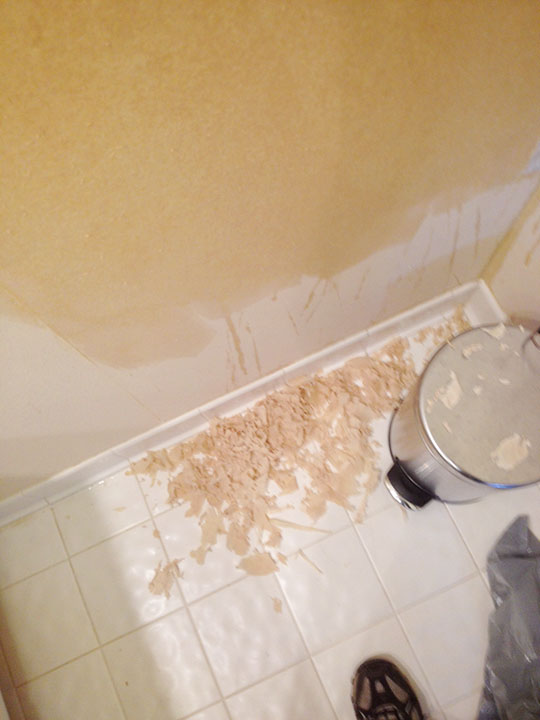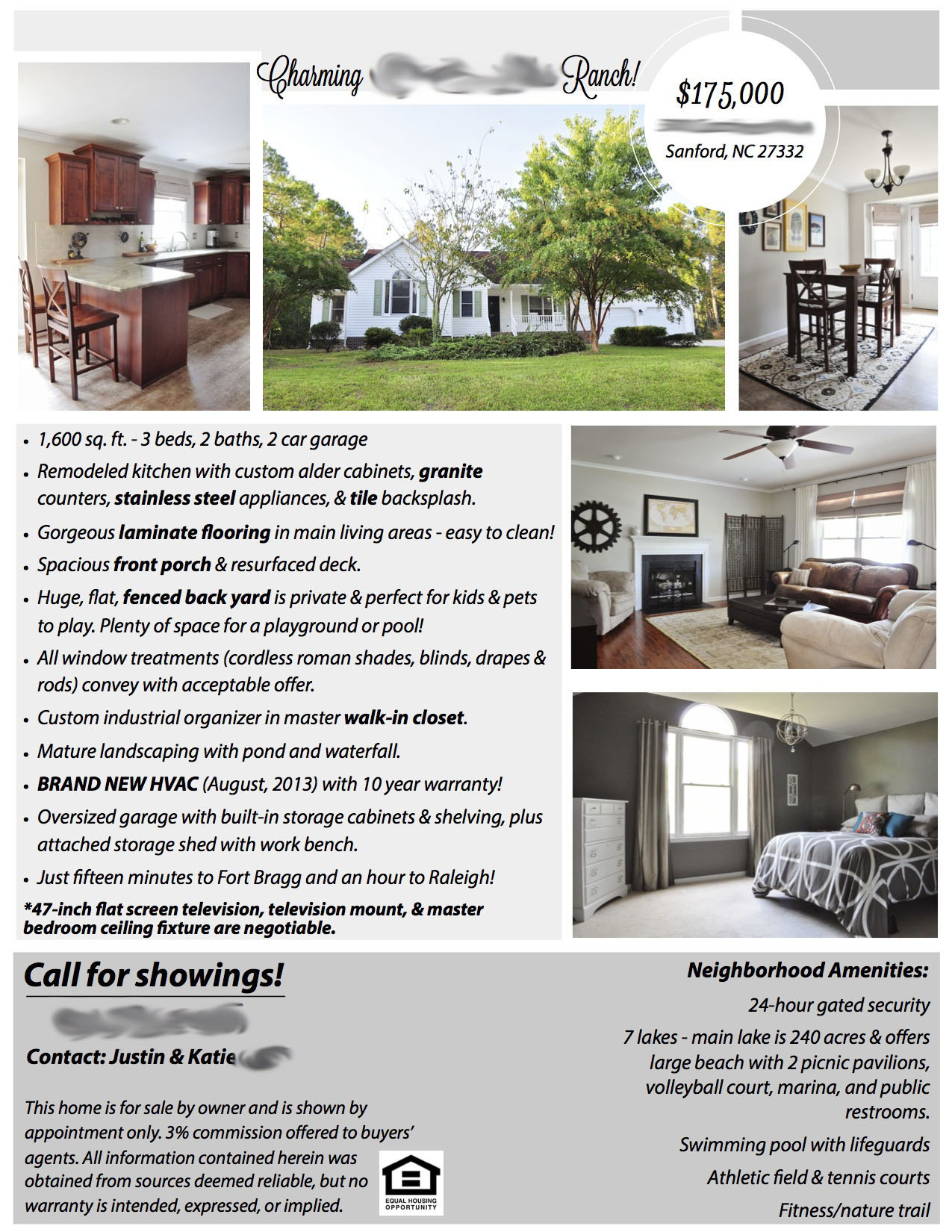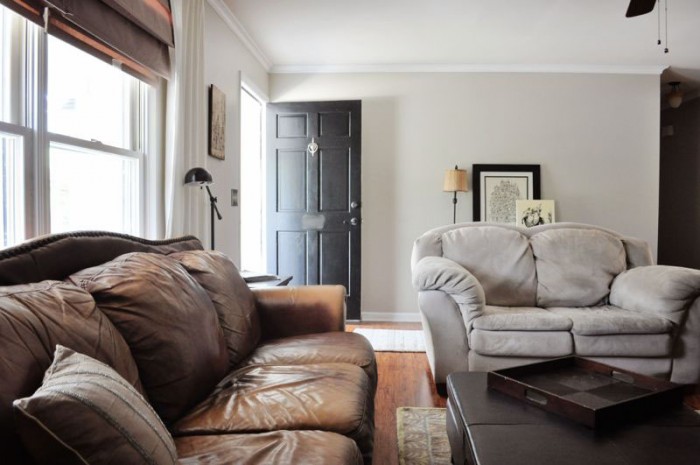How We Sold Our House In Just Two Weeks.
*This is a long and oddly informative post. If you’re in the mood for something a little more lighthearted on this Christmas eve, I’ve had the honor of being featured on one of my favorite travel blogs, Misadventures with Andi. Go check it out!
Sometimes it seems like things are harder for me than everyone else.
There are bloggers all over the place who can strip a room of wallpaper in a single afternoon or book tickets to Burma on the cheapest flight with pre-arranged lodging and a map of the nearest bus stations. I, on the other hand, try to book a vacation, get quickly overwhelmed with the slurry of options, and give up before anything’s settled. And yesterday I spent four hours scraping at the wallpaper backing in our master bathroom using a spray bottle, some fabric softener, and eventually my dear new neighbor’s clothes steamer, and ended up with only a fraction of two walls complete and a heap of frustration.

The good news? The steam provided one helluva facial.
The point is that it seems like everywhere I look, people are snapping their fingers and making things happen. Some home bloggers can churn out five projects a week, while Justin and I will likely be walking on stripped-but-not-stained hardwoods for at least a month.
But there is one thing that we seemed to do fairly efficiently, and that was sell our last house. In just two weeks. Without the use of a listing agent.
And here’s how we did it:
1) We didn’t use a listing agent. But also we did.
The world of Real Estate is a tricky one. Laws vary from state to state, and navigating the legal waters — money juggling, timelines, inspections — not to mention dealing with emotionally stressed crazies like me, is usually a job best left to an agent. For so many reasons. We used the help of an agent when we bought our first house, and we used one when we bought this house. The first time it was not a great experience (but that’s another story for another time). The second time, however, we knew more of what we were doing, and we knew our agent worked for us. Working with a buyer’s agent is pretty straightforward. You tell them what you’re looking for, they show you what’s available, and depending on whether or not you’re realistic about your expectations and your agent is adept at searching the system for properties that fit and is familiar with areas you might like, the whole thing works pretty great and, usually, at no cost to you, the buyer.
And that’s where things get a little… well… odd. See, it’s the sellers who usually end up paying all realtor fees.
Cost Breakdown:
In North Carolina, it’s customary for the seller to pay 6% of the total sale price to the their agent (the listing agent) who, in turn, would dish out half of that to the buyer’s agent. That’s how they enticed other agents to show their listings. So 3% to each agent, both paid by the seller. Meaning if your house sells for $200,000, you owe $12,000 to your agent when the deal is done, $6,000 of which is likely going to the buyer’s agent. It doesn’t matter how long you lived in the house, how much money you put into it, or whether you made a profit on the deal or not. The listing agent wants to get paid for services rendered, which usually include adding the house to the Multiple Listing Service (MLS), marketing it however you agreed in your contract, and dealing with the negotiations and legal stuff when you get a buyer. So, if you’re lucky enough to make a profit in this market, a huge chunk of that can easily fall to an agent.
After nearly seven years paying cash to fix up our last house through a real estate slump, Justin and I knew we’d be lucky to break even after paying listing agent fees. Not to mention the fact that our a/c decided it needed replacing just a month before we put the house on the market. Add to that the fact that I worked as a freelancer writing listings for agents and taking professional photographs, I already had the skills necessary to market the house — dare I say it, better than most agents.

What we really needed an agent for was adding the house to the MLS so other realtors would see it, and helping with the legal stuff if/when we found a buyer. Fortunately, my old boss was willing to add our listing to the MLS for a one-time flat fee of $20, which covered his cost to add it. And a dear friend of mine, who happens to be a licensed Realtor, offered to advise us when the time came to sell. North Carolina requires the use of a lawyer when closing a house, so we knew everything else would be legit.
We made sure to note in the listing (and our flyer) that we’d still be offering 3% to a buyer’s agent. It’s a kooky concept, considering that meant we were paying someone to negotiate against us on her client’s behalf, but unfortunately that’s just the way the system works. In fact, it’s pretty much the only way to get agents to show your property.*
*It turns out our buyer actually found our listing from my Zillow advertisement, so she may have insisted her agent show it to her regardless of whether we were offering 3%, in which case either the buyer would’ve had to pay her agent the fee, or they would’ve had to work out a deal with us. It’s just a bigger risk to not offer the fee.
In the end, it all worked out, and since we sold our house for $170,000, listing it ourselves ended up saving us $5,100 (minus the $20 to get it in the MLS, the cost of printing our own flyers, an $80 ad on MilitaryByOwner.com, and a thank-you gift we gave my friend after closing).
I’m not going to lie — it still “hurt” to pay $5,100 to the buyer’s agent who, quite frankly, was a pain in the ass to work with, but such is life.
2) Our house was unique.
We knew we had a good sell on our hands after several agents who showed our house to their clients tried to “scalp” the listing. Knowing we didn’t have a listing agent, we’d get calls like, “Well the client I showed it to wasn’t interested, but I may have someone else who is. It’s going to be difficult dealing with all of the paperwork when it comes to closing — I can take care of all of that for you when it the time comes, for just two-and-a-half percent. I’ll send over the paperwork.” Unfortunately for them, these calls only confirmed my belief that a) we could sell it ourselves, and b) for us, it was a wise move to not list with an agent. Agents don’t beg for hard-to-sell listings, otherwise they end up throwing away money marketing houses that never sell.
When we bought the place, we were smart. It needed cosmetic work, but it was one of the cheapest homes in a desirable community. We couldn’t know this at the time, but several years later other nearby developments started popping up with new construction homes starting in the low 200K’s. This made it very difficult for people with the more expensive homes in the neighborhood to sell, but our house was still affordable for the lower-end buyer, and there wasn’t much surrounding competition.
3) We were smart about money and had realistic expectations.
Several agents told us we should’ve had a higher asking price — $180,000 instead of $175,000. But when Justin and I analyzed our bottom line, we realized that selling quickly was our goal over making money. At $175,000, we’d still make a tidy profit (even if we accepted a lower offer), and the price would help us show up in more MLS searches. If a buyer’s agent has a client looking for homes with a max budget of $175,000, our house would show up in that search. Likewise, if a buyer’s agent had a client looking for a home with a minimum budget of $175,000, we’d show up in that search as well.
Search: $150,000 – $175,000 OR $175,000 – $200,000
We initially thought we’d list at $174,900 to make the number mentally sound less expensive to buyers, but my Realtor friend taught me the search engine pricing trick and frankly, it just made more sense. Our listing price also put us in a great position over what little competition we had. The other house in our neighborhood that was listed for the same price was 200 square feet bigger, but it hadn’t been updated since 1980. Some buyers will go for square footage, and some for move-in-ready. We just had to hope that our buyer would come along.
When it came to getting the house ready to sell, we knew we had to spend a little money. It wasn’t even about making money at that point – it was just about enticing people enough to make an offer — any offer. But we knew that the better the house looked, the more likely we’d be to get one. So we forked out the dough to have the deck resurfaced, the siding power washed, and some rotting woodwork repaired. It was well worth it in the end.
We were also careful to not spend too much money while maintaining realistic expectations about repairs that might get requested. The carpet in our bedrooms hadn’t been replaced since the house was built in 1994, and considering it was a rental before we’d moved in, they weren’t in the best of shape. We were ready to replace them before listing the house, but my agent friend suggested we just shampoo them and see if anyone requested carpet replacement in their offer. It turned out to be great advice! We were prepared for fork over the dough to replace the carpets when the house sold, but the request never came. Still. We were realistic and prepared to deal with it, just in case. Something like that isn’t worth losing a deal.
4) We treated every showing like it was the last showing.
Ultimately, there was nothing we could do about the “small” size of our 1,600 square foot home. The only negative feedback we ever received was that people were looking for something bigger. In fact, a couple of near-offers ended up going to new construction instead, which was priced at least 30K higher than our little gem. Frustrating as it was, knowing we were competing with houses much bigger and newer than ours was a good sign. It meant we could hang with the popular crowd. We were move-in-ready and priced to sell — it was only a matter of time.

Therefore, we treated every showing like it was THE showing to end all showings. Before each showing, I cleaned the house from top to bottom and rid it of all evidence that we owned dogs. I opened windows if it was nice outside, plugged in the Scentsys, turned on all of the lights, and played an instrumental jazz CD we’d picked up from a band in San Francisco. Then I’d pack the mutts in the car and drive around the neighborhood until it was over. We did it as much for the agents as we did for their clients. Buyer’s agents love showing homes that look — and smell — nice. So even if that particular client wasn’t interested, we knew they’d keep an eye out for buyers who were. Because our house showed like we wanted to sell it.
5) Dumb luck.
Late autumn can be a tough time of year to sell, since everyone’s getting distracted with the holidays. The good news, though, is that there generally tends to be less listings on the market, which means less competition. So while not as many buyers are looking, it’s usually the buyers that need a place to stay. Pronto. And that’s what happened with us.
The truth is, there are about a million factors that come into play when selling your house. And if there was a magic formula to getting ‘er done, I’d be sitting on a balcony in Kuala Lumpur collecting royalties on my book. But I’m not. Selling a home can be intense, frustrating, and stressful. All you can do is prepare, then cross your fingers and hope for the best.
Ways to tell if you should work with an agent:
Are you emotionally attached? Your house is no longer your house when you put it on the market. It’s property. Its value is negotiable, and it’s subject to opinions you might not want to hear. If you can’t deal with that, don’t. Hire an agent who can be objective for you.
Are you knowledgeable about local real estate laws or know someone who is? While not overly complicated, the specific rules and timelines can get overwhelming once an offer is on the table. Not to mention, a buyer’s agent could potentially smell your naivety and take advantage. It’d be a shame for a deal to fall through — or worse, to lose money — on some fine print that falls between the cracks.
Are you willing to spend money to make money? Effectively marketing a house can cost a little dough. Shelling out for professional pictures or paying to have your listing in the MLS can make a huge difference in the number of interested buyers. The way I looked at it, we could spend $500 on last-minute upgrades to get the house show-ready, or we could waste months of time and potentially end up paying the mortgage on that house while renting a house in Virginia. When we looked at it that way, spending the money up-front to increase our chances of selling was a no-brainer!

Comments
I actually just can’t get past the idea of a whole house for less than $400,000. I know markets are all different, but to me what you sold for sounds like prices from the late 80s. And your pics make it look so beautiful!
I’d venture to guess that prices are closer to that market throughout much of the U.S. and Canada than in the major cities like where you live. There are a LOT of “less desirable” areas in this large landmass of North America that are actually affordable. The problem is that yeah… they’re less desirable. :)
I love the flyer you made – I thought the price of $175,000 was a joke though – we live in NJ and there is absolutely no way that you could get such a beautiful home for less than $300,000 (at least)!
Sorry to hear how frustrating the wall paper removal is in your new place. You will get it though and soon you will have everything as you like. And in the meantime, it is an awesome new place because it is your home.
Hope you have a wonderful holiday!
Ha! Yeah that’s the same problem I had moving from Fayetteville, NC to Newport News, VA. Prices where we live in VA are much higher than what we were used to (though still much lower than many other places in the U.S.). It’s crazy!
Thanks Rachel, and I hope you have a wonderful holiday as well! :)
Fortunately, this is all something I won’t have to deal with for at least 10-ish years. When/if that time comes I’ll also hopefully be able to turn a bit of a profit since I’m going to be doing a lot of work to the house.
Not a LOT, but things that definitely need to be done.
I’ll actually be referring to your closet renovation come Spring since I’m hoping to re-do the shelving in there and was thinking of doing something similar to what you did with your closet.
But we’ll see how that goes since first I need to renovate my shed.
You know, 10 years goes by faster than you’d think! ;) Definitely no rush to get everything done, but if we had it to do over again, we’d get the big stuff out of the way within the first year just so we had more time to enjoy it. Of course, we didn’t have the *money* to get everything done the first year, so yeah. We’ll be doing it a bit different in this house.
Sigh. I miss my closet. It wasn’t the absolute most efficient organizer space-wise, mind you, but damn if it didn’t look cool. It was definitely functional, too. Let me know if you have any questions! And a shed renovation? Will that be your man cave? :)
Yes, and no. The outer walls need to be fixed, then painted. The entire door, and door frame need to be ripped out, re-built, and replaced. The bottom perimeter needs to be reinforced. Once all of that has been done I want to ‘finish’ the inside. Re-built all of the shelving. Finish the actual ceiling to close it off from the elements, and bugs. Figure out if it’s still wired for electric.
Yikes! Sounds like a beast!! Fortunately the shed that came with this house is in great shape (I think). Though like you, Justin wants to run electricity to it. You silly boys and your fascination with voltage.
[…] speech about the pros and cons of using a realtor (almost always a plus when buying a house, though maybe not so much when selling one), what qualities he should probably look for since re-sale is always a concern for military buyers, […]